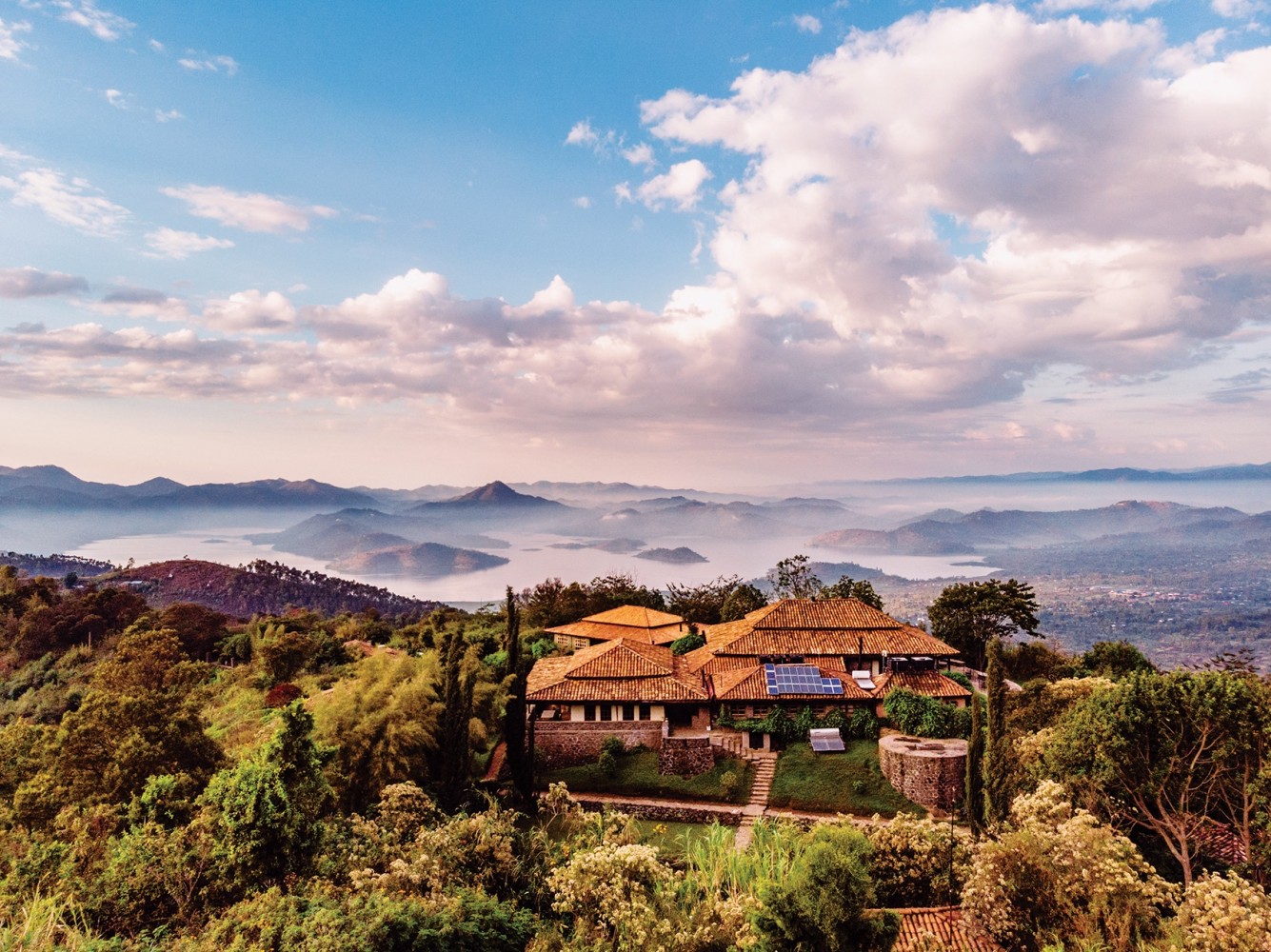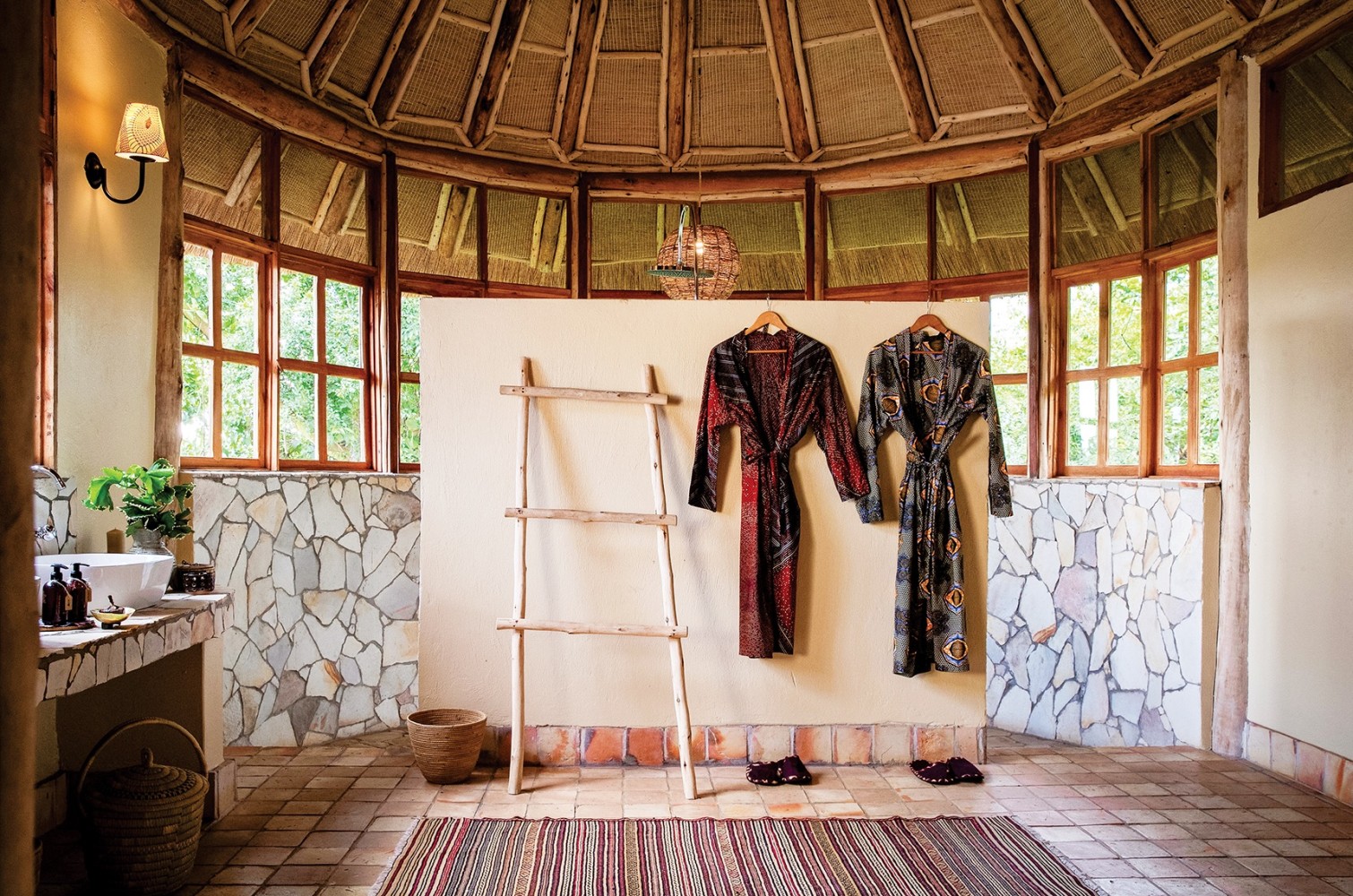The Rwenzori Mountains are the hidden secrets of Africa. Nearly as tall and just as majestic as Kilimanjaro, they form an ice-capped ridge dividing Uganda from the Democratic Republic of Congo that few travelers have sought to climb. The lush foothills ripple out across southern Uganda toward Lake Victoria, opening onto a savannah frequented by elephants, lions and buffalo.
African Grandeur
Discovering a new range of sustainable volcano lodges in Africa
By Ellen Himelfarb - October 22nd 2024
This is the ecosystem Praveen Moman was born into, and which lured him back in adulthood after fleeing decades of chaos and war. His company Volcanoes Safaris, developed in the 1990s, was his way of helping to return this precious equatorial landscape to its wild origins, to the local communities and especially to the endangered primates that nestle in the forest. Kibale Lodge, built on a ridge of the Albertine Rift, is the crown—and great showcase—of his efforts to date.
The main property and eight luxury bandas, Swahili for “cottages,” are molded from hand-cut stone, local bricks, wood and thatch to look as if they’ve always been there—Moman’s team includes many skilled craftspeople from nearby communities who work in time-honored techniques. Interior archways leading to the bathrooms feature locally sourced stone. “Each lodge is different, but a continuation of our philosophy,” says Moman. Furnishings, textiles and even lights are handwoven by artisans, including the local Batoro people who make up most of Kibale’s staff. The long drive to the main lodge ends outside a fire-lit lounge, leading into dining terraces with views of the pool, lake and mountains. “From here,” says Moman, “you’re looking at the Rwenzoris eye to eye.”
Kaleidoscopes of butterflies flutter around the outdoor showers. Undulating walking paths echo with the squawking of turacos and nightjars. Even more remarkable, this temperate corner of Uganda is the world’s great ape capital, and Volcanoes Safaris has cornered the market on great ape tourism. Guests at Kibale, to be completed this year, can partake in a multiday unique itinerary through the forest and wetlands to Kyambura Gorge, a deep fissure in the plain where chimps swing through the trees.

Mornings begin slowly, with a 30-minute drive into Kibale National Park. Some 1,500 chimpanzees live in this orchid-dusted terrain. Moman says it more closely resembles a dappled New England forest than the thick, unnavigable jungle that Uganda might bring to mind. “You don’t feel hemmed in. It’s like walking in a beautiful woodland when, out of the blue, you’ll hear a chimp calling in the distance.” The tree canopy is home to three habituated chimp groups.
You might not recognize the chimps immediately. Their piercing call and response alerts you to a presence. Suddenly, you’re conscious of a tail swinging lazily from the trees. Highly skittish, the creatures will leap down, size you up, then sling away just as quickly. From the other Volcanoes Safaris lodges, you can see the gorillas who, on the other hand, are watchers: highly sedentary, “like a lazy family, rooted in the forest eating popcorn,” says Moman. He’s joking. Still, as long as they’ve got a snack on hand, they’re unconcerned with interlopers. While chimps use the trees as pathways, the gorillas use them as pedestals to support their slumping figures.
Kibale and its neighbors Kyambura, Bwindi and Mgahinga form a small but crucial habitat of about 500 square miles—less than 15 percent of the area of Yellowstone. “These are tiny, isolated islands of habitat,” says Moman. “To the naked eye, they might seem like fragmented forest.” Nonetheless, they form the finest primate site in Africa.
Kibale is Volcanoes Safaris’ fifth retreat, completing a loop of hideaways Moman has been slowly, thoughtfully developing since 1997. They anchor the company’s larger purpose: to support the work of renowned primatologists like Jane Goodall and Dian Fossey with a landmark program of ecotourism, conservation and community outreach. Together, their scope makes Volcanoes Safaris the great ape specialist of the world.

Working with Ugandan rangers, old friends and experts like Goodall herself, Moman has crafted a unique program of safaris that tiptoe into the territory of chimps, gorillas, golden monkeys, silverbacks and their cousins. Half-day treks from their Bwindi Lodge culminate in fireside chats or cocktails at the world-famous Bwindi Bar, at Bwindi Impenetrable National Park.
Safaris also delve into conservation and community projects undertaken by Volcanoes Safaris Partnership Trust—a charitable onus the company takes as seriously as its hospitality. Guests can visit monitoring teams to learn about the enormous challenges to the ecosystem. They can contribute GPS data and wildlife photographs to the ongoing carnivore census, and meet the villagers their tourism dollars help support. A fee from every paying guest goes toward training disadvantaged youth, building homes for indigenous groups, supplying water tanks and supporting craft collectives. Baskets and bathrobes by local weavers are available to buy.
True to the company name, their Virunga and Mount Gahinga lodges also offer volcano treks across the Virunga mountains, home to the dwindling population of mountain gorillas. You could spend a day climbing Mount Gahinga or trekking sister volcanoes Muhabura and Sabyinyo. Climbs begin at 7:30 a.m. and end in time for a swim.
For dinner, you might have fresh game grilled on an open fire with sweet potato and the local delicacy firinda, made with slow-cooked beans and eaten with steamed kalo (millet bread) or matooke (bananas) served with peanut sauce and dodo (steamed greens). Moman’s botanist Celine Ishimwe designed a vegetable garden of beans, greens and tomatoes and also cultivates hydroponic lettuce. Surrounding farms provide organic eggs and rice. Coffee is strong and wine plentiful. Some locally inspired snacks include banana mandazi (Swahili-style donut) and passion fruit curd, mango tartlet petit fours, and roasted sweet bananas with cream.
Still, every meal is tailored to individual tastes. “Yes, we have menus, but they’re not meant to force you,” says Moman. “You can order ‘outside the box.’ We try and go with the flow.”
The allure of the region extends even to the spa. Massages at Kibale are an important part of the experience, because the Batoro community believes in the healing power of physical touch. One treatment involves hot towels soaked in eucalyptus. Moman says the evergreen naturally draws out muscle pain. For the flagship rungu massage, masseurs prod at the body with a wooden club—“not to be aggressive, but to highlight pressure points,” he says. “It’s like a stronger version of the Scandinavian massage. The club gives more leverage to work a particular knot.”

These are the perks that come with your reservation—though it’s unlikely you’ll have any stress left to ease, because an hour on the ridge with the night birds calling is as close to heaven as you’re bound to get.
Related articles
-
Go to articleLifestyle
Navigating New Orleans
By Elio Iannacci - October 24th 2024
A journey through the Creole, Cajun and contemporary flavors of Louisiana’s most vibrant city.
-
Go to articleLifestyle
Byron Bay Bliss
By Kelly Stock - October 23rd 2024
Australia’s idyllic and iconic eastern coastline.
Latest articles
-
Go to articleInsight
Editor's Letter
By Pierre Beaudoin - October 25th 2024
A Message from Pierre Beaudoin Chairman of the Board, Bombardier
-
Go to articleInsight
Introducing The Aviator Lounge in Monaco
By Rachel Ingram - October 24th 2024
Behind the scenes at Bombardier’s multifaceted meeting space



